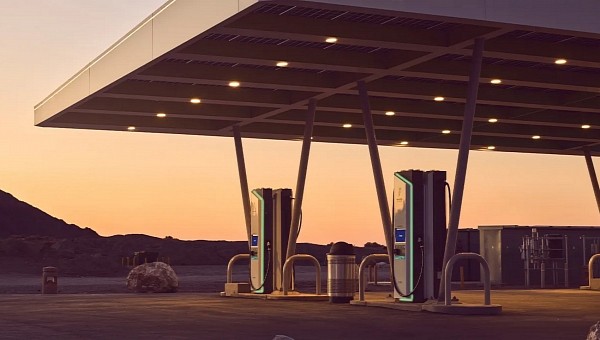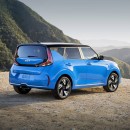With the surge in popularity of electric vehicles partly driven by government incentives, the reputation of gas-powered vehicles in the eyes of many government folks at the state and federal levels has taken a beating in the last couple of years.
California was the first state to pass a legislation banning the sale of gas-powered vehicles, which takes effect in 2035. Other states followed California's lead just as they have in the past on environmental issues.
Oregon and Washington also have legislation in place for 2035, which means, at that point, the entire West Coast of the country will ban the sale of all new vehicles powered by gas or diesel means in favor of those powered by electric batteries, plug-in hybrid drivetrains or fuel cell systems. Washington would later move up its ban to 2030 in a bill signed in early 2022.
Other states to join in the ban party are: Connecticut, Hawaii, Massachusetts, Maine, New York, Delaware, North Carolina, New Jersey, New Mexico, and Rhode Island.
It doesn't end there, as The National Highway Traffic Safety Administration (NHTSA) is planning to impose new fuel economy standards for the 2027 model year and beyond, further putting the squeeze on automakers to ditch fossil fuel vehicle manufacturing. A proposal on the new standards is planned for April and will be finalized and adopted within a year.
The Environmental Protection Agency (EPA) is also in on the act stating it plans to "introduce companion stringent vehicle greenhouse gas emissions standards" beginning in 2027 and lasting through at least 2030 by March.
The writing has been on the wall about the fate of gas-powered vehicles in the U.S. for some time, and that writing may get a little more bold if the federal government joins the California coalition timeline.
The current U.S. president has somewhat of a more conservative and realistic expectation moving forward and is lobbying for 50% of all new vehicles starting in 2030 to be electric or plug-in hybrid models and has yet to endorse California's 2035 plan.
Former NHTSA administrator and now California Air Resources Board Executive Officer Steven Cliff told Reuters recently that the federal government should "look at stringency that's equivalent to our rules."
"We're 68% zero emissions in 2030, so modeling that and looking at that as an option for 2030 is absolutely critical," he said.
Automakers are heavily penalized if they cannot meet the federal requirements established by the NHTSA, which increased significantly in March of last year. However, the agency has not collected any penalties for failure to meet the Corporate Average Fuel Economy (CAFE) requirements for 2019 through 2021 due to some issues being under review and pending litigation.
The auto industry in the past stated penalties for not meeting the CAFE requirements, which could cost them at least a billion dollars annually. That statement alone indicates a possible fingers-to-the-fire opening for government agencies to take advantage of in terms of passing harsher penalties to continue the transformation of the industry to electric.
The industry did catch a break under the prior administration that rolled back an annual 5% increase in vehicle efficiency to just 1.5%. However, the current administration reversed that action and instructed the agencies to get to work on new more stringent standards which brings us to where we are today.
The threat to gas-powered vehicle production in the States is real and the eventual ban on production altogether is imminent.
Oregon and Washington also have legislation in place for 2035, which means, at that point, the entire West Coast of the country will ban the sale of all new vehicles powered by gas or diesel means in favor of those powered by electric batteries, plug-in hybrid drivetrains or fuel cell systems. Washington would later move up its ban to 2030 in a bill signed in early 2022.
Other states to join in the ban party are: Connecticut, Hawaii, Massachusetts, Maine, New York, Delaware, North Carolina, New Jersey, New Mexico, and Rhode Island.
It doesn't end there, as The National Highway Traffic Safety Administration (NHTSA) is planning to impose new fuel economy standards for the 2027 model year and beyond, further putting the squeeze on automakers to ditch fossil fuel vehicle manufacturing. A proposal on the new standards is planned for April and will be finalized and adopted within a year.
The Environmental Protection Agency (EPA) is also in on the act stating it plans to "introduce companion stringent vehicle greenhouse gas emissions standards" beginning in 2027 and lasting through at least 2030 by March.
The writing has been on the wall about the fate of gas-powered vehicles in the U.S. for some time, and that writing may get a little more bold if the federal government joins the California coalition timeline.
The current U.S. president has somewhat of a more conservative and realistic expectation moving forward and is lobbying for 50% of all new vehicles starting in 2030 to be electric or plug-in hybrid models and has yet to endorse California's 2035 plan.
Former NHTSA administrator and now California Air Resources Board Executive Officer Steven Cliff told Reuters recently that the federal government should "look at stringency that's equivalent to our rules."
"We're 68% zero emissions in 2030, so modeling that and looking at that as an option for 2030 is absolutely critical," he said.
Automakers are heavily penalized if they cannot meet the federal requirements established by the NHTSA, which increased significantly in March of last year. However, the agency has not collected any penalties for failure to meet the Corporate Average Fuel Economy (CAFE) requirements for 2019 through 2021 due to some issues being under review and pending litigation.
The auto industry in the past stated penalties for not meeting the CAFE requirements, which could cost them at least a billion dollars annually. That statement alone indicates a possible fingers-to-the-fire opening for government agencies to take advantage of in terms of passing harsher penalties to continue the transformation of the industry to electric.
The industry did catch a break under the prior administration that rolled back an annual 5% increase in vehicle efficiency to just 1.5%. However, the current administration reversed that action and instructed the agencies to get to work on new more stringent standards which brings us to where we are today.
The threat to gas-powered vehicle production in the States is real and the eventual ban on production altogether is imminent.





